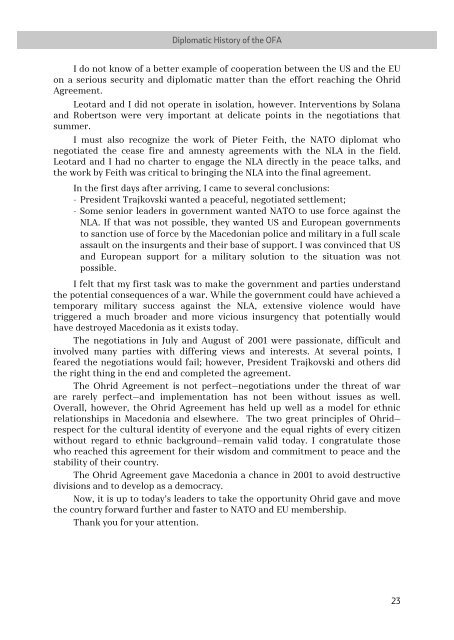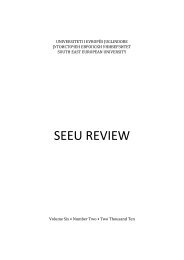- Page 1 and 2: Ten years from the Ohrid Framework
- Page 3 and 4: Content î OHRID FRAMEWORK AGREEMEN
- Page 5: î The OFA reflected in information
- Page 8 and 9: The aim of this scientific research
- Page 11 and 12: OFA - a New Political Philosophy fo
- Page 13 and 14: OFA - a New Political Philosophy fo
- Page 15 and 16: OFA - a New Political Philosophy fo
- Page 17 and 18: OFA - a New Political Philosophy fo
- Page 19: OFA - a New Political Philosophy fo
- Page 25 and 26: The Road Ahead: The Path of Leaders
- Page 27: The Road Ahead: The Path of Leaders
- Page 30 and 31: Christopher Yvon There has been a g
- Page 32 and 33: Ferenc Kekesi This has in turn fost
- Page 34 and 35: Alexandros Yannis Since 2009, you h
- Page 36 and 37: Arben Çejku The interest of the co
- Page 39 and 40: Speech of the ambassador Skënder D
- Page 41: Speech of the ambassador Skënder D
- Page 44 and 45: David L. Phillips In the years afte
- Page 47 and 48: Regional Perspectives on OFA as a M
- Page 49 and 50: The Ohrid Peace Agreement and the c
- Page 51 and 52: The Ohrid Peace Agreement and the c
- Page 53 and 54: The Ohrid Peace Agreement and the c
- Page 55 and 56: The Ohrid Peace Agreement and the c
- Page 57 and 58: The Linguistic Framework within the
- Page 59: The Linguistic Framework within the
- Page 62 and 63: Rizvan Sulejmani What can be conclu
- Page 64 and 65: Rizvan Sulejmani But this freedom w
- Page 66 and 67: Rizvan Sulejmani Democratization. M
- Page 69 and 70: The Ohrid Framework Agreement: A to
- Page 71 and 72: The Ohrid Framework Agreement: A to
- Page 73 and 74:
Illiberal Democracy and Cultural Et
- Page 75 and 76:
Illiberal Democracy and Cultural Et
- Page 77 and 78:
Illiberal Democracy and Cultural Et
- Page 79 and 80:
Illiberal Democracy and Cultural Et
- Page 81:
Illiberal Democracy and Cultural Et
- Page 84 and 85:
James Pardew The advantages are obv
- Page 87 and 88:
Political spirit and the state admi
- Page 89 and 90:
Political spirit and the state admi
- Page 91 and 92:
Political spirit and the state admi
- Page 93 and 94:
Political spirit and the state admi
- Page 95 and 96:
Political spirit and the state admi
- Page 97 and 98:
Political spirit and the state admi
- Page 99 and 100:
Political spirit and the state admi
- Page 101 and 102:
Political spirit and the state admi
- Page 103 and 104:
Political spirit and the state admi
- Page 105 and 106:
Political spirit and the state admi
- Page 107 and 108:
Political spirit and the state admi
- Page 109 and 110:
Political spirit and the state admi
- Page 111 and 112:
Political spirit and the state admi
- Page 113 and 114:
Political spirit and the state admi
- Page 115 and 116:
Political spirit and the state admi
- Page 117 and 118:
Political spirit and the state admi
- Page 119 and 120:
Political spirit and the state admi
- Page 121:
Political spirit and the state admi
- Page 124 and 125:
Ismail Zeneli | Adnan Jashari | Jet
- Page 126 and 127:
Ismail Zeneli | Adnan Jashari | Jet
- Page 128 and 129:
Ismail Zeneli | Adnan Jashari | Jet
- Page 130 and 131:
Ismail Zeneli | Adnan Jashari | Jet
- Page 132 and 133:
Ismail Zeneli | Adnan Jashari | Jet
- Page 134 and 135:
Ismail Zeneli | Adnan Jashari | Jet
- Page 136 and 137:
Ismail Zeneli | Adnan Jashari | Jet
- Page 138 and 139:
Ismail Zeneli | Adnan Jashari | Jet
- Page 140 and 141:
Ismail Zeneli | Adnan Jashari | Jet
- Page 142 and 143:
Ismail Zeneli | Adnan Jashari | Jet
- Page 144 and 145:
Ismail Zeneli | Adnan Jashari | Jet
- Page 146 and 147:
Ismail Zeneli | Adnan Jashari | Jet
- Page 148 and 149:
Ismail Zeneli | Adnan Jashari | Jet
- Page 150 and 151:
Ismail Zeneli | Adnan Jashari | Jet
- Page 152 and 153:
Ismail Zeneli | Adnan Jashari | Jet
- Page 154 and 155:
Ismail Zeneli | Adnan Jashari | Jet
- Page 157:
The OFA Ten years later: Public fin
- Page 160 and 161:
Abdylmenaf Bexheti Today in the 10-
- Page 162 and 163:
Abdylmenaf Bexheti Sources of 0 bud
- Page 164 and 165:
Abdylmenaf Bexheti Regional biro fr
- Page 166 and 167:
Abdylmenaf Bexheti Any increase in
- Page 168 and 169:
Abdylmenaf Bexheti a) With 45 mil.d
- Page 170 and 171:
Abdylmenaf Bexheti e) Art and galle
- Page 172 and 173:
Abdylmenaf Bexheti International co
- Page 174 and 175:
Abdylmenaf Bexheti From the data we
- Page 176 and 177:
Abdylmenaf Bexheti The unfavorable
- Page 178 and 179:
Abdylmenaf Bexheti This area should
- Page 180 and 181:
Rufi Osmani Legal basis that sets t
- Page 182 and 183:
Rufi Osmani Comparative analysis of
- Page 184 and 185:
Rufi Osmani Income tax and non tax
- Page 186 and 187:
Rufi Osmani 60% 50% 40% 30% 20% 10%
- Page 188 and 189:
Rufi Osmani In 2005 the government
- Page 191 and 192:
Unemployment in the Republic of Mac
- Page 193 and 194:
Unemployment in the Republic of Mac
- Page 195 and 196:
Unemployment in the Republic of Mac
- Page 197:
Unemployment in the Republic of Mac
- Page 200 and 201:
Ferit Rustemi | Mustafa Ibrahimi |
- Page 202 and 203:
Ferit Rustemi | Mustafa Ibrahimi |
- Page 204 and 205:
Ferit Rustemi | Mustafa Ibrahimi |
- Page 206 and 207:
Ferit Rustemi | Mustafa Ibrahimi |
- Page 208 and 209:
Ferit Rustemi | Mustafa Ibrahimi |
- Page 210 and 211:
Ferit Rustemi | Mustafa Ibrahimi |
- Page 212 and 213:
Ferit Rustemi | Mustafa Ibrahimi |
- Page 214 and 215:
Ferit Rustemi | Mustafa Ibrahimi |
- Page 216 and 217:
Ferit Rustemi | Mustafa Ibrahimi |
- Page 218 and 219:
Ferit Rustemi | Mustafa Ibrahimi |
- Page 220 and 221:
Ferit Rustemi | Mustafa Ibrahimi |
- Page 222 and 223:
Ferit Rustemi | Mustafa Ibrahimi |
- Page 224 and 225:
Ferit Rustemi | Mustafa Ibrahimi |
- Page 226 and 227:
Ferit Rustemi | Mustafa Ibrahimi |
- Page 228 and 229:
Ferit Rustemi | Mustafa Ibrahimi |
- Page 230 and 231:
Ferit Rustemi | Mustafa Ibrahimi |
- Page 232 and 233:
Ferit Rustemi | Mustafa Ibrahimi |
- Page 234 and 235:
Ferit Rustemi | Mustafa Ibrahimi |
- Page 236 and 237:
Ferit Rustemi | Mustafa Ibrahimi |
- Page 238 and 239:
Ferit Rustemi | Mustafa Ibrahimi |
- Page 240 and 241:
Ferit Rustemi | Mustafa Ibrahimi |
- Page 242 and 243:
Ferit Rustemi | Mustafa Ibrahimi |
- Page 244 and 245:
Ferit Rustemi | Mustafa Ibrahimi |
- Page 246 and 247:
Ferit Rustemi | Mustafa Ibrahimi |
- Page 249 and 250:
The OFA Reflected in information te
- Page 251 and 252:
The OFA Reflected in information te
- Page 253 and 254:
The OFA Reflected in information te
- Page 255 and 256:
The OFA Reflected in information te
- Page 257 and 258:
The OFA Reflected in information te
- Page 259 and 260:
The OFA Reflected in information te
- Page 261 and 262:
The OFA Reflected in information te
- Page 263 and 264:
The OFA Reflected in information te
- Page 265:
î Public opinion research about OF
- Page 268 and 269:
Hasan Jashari The main point of thi
- Page 270 and 271:
Hasan Jashari Realization of the su
- Page 272 and 273:
Hasan Jashari 8. The Importance of
- Page 274 and 275:
Hasan Jashari The survey was conduc
- Page 276 and 277:
Hasan Jashari Step 5: WHY do they c
- Page 278 and 279:
Hasan Jashari Regarding the residen
- Page 280 and 281:
Hasan Jashari The Framework Agreeme
- Page 282 and 283:
Hasan Jashari Media report partiall
- Page 284 and 285:
Hasan Jashari . Very big in improvi
- Page 286 and 287:
Hasan Jashari . None Little Partly
- Page 288 and 289:
Hasan Jashari A similar response ma
- Page 290 and 291:
Hasan Jashari How do we see the fut
- Page 292 and 293:
Hasan Jashari Badinter Principle 24
- Page 294 and 295:
Hasan Jashari The same thing applie
- Page 296 and 297:
Hasan Jashari So we are dealing wit
- Page 298 and 299:
Hasan Jashari In local self-governm
- Page 300 and 301:
Hasan Jashari As for George Roberts
- Page 302 and 303:
Hasan Jashari There is a high refle
- Page 304 and 305:
Hasan Jashari Regarding the current

















